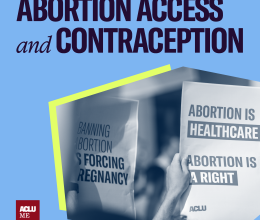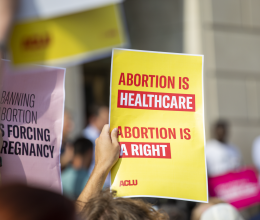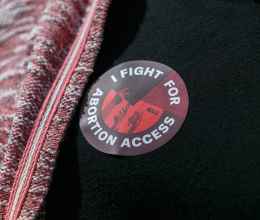This Wednesday, May 13th, the Judiciary Committee will hear testimony on two anti-abortion bills. Testimony for the two bills will be heard at 1:00 in Room 438 in the Statehouse. If you’re able to join us on Wednesday, please wear pink to show your support for defeating these bills.
The first bill, LD 1312, An Act To License Outpatient Surgical Abortion Facilities, would require that abortion facilities be licensed by the Department of Health and Human Services, and that, after licensing, the facilities would be forced to adhere to operational standards adopted by DHHS. Regardless of what the bill supporters say, LD 1312 is a TRAP bill. You can read more about TRAP bills here. Targeted Regulation of Abortion Provider bills, or TRAP bills, place unnecessary and burdensome regulations on abortion providers and facilities, often causing them to close. Abortion providers in Maine are already licensed by the state and are already subject to strict oversight by Maine’s Board of Medicine. Abortions are already safe procedures – less than 1% of patients experience any complications during their procedure. Beyond being unnecessary, LD 1312 also promotes the myth that abortions are somehow unsafe, and therefore providers performing the procedure require extra regulation.
The second bill is LD 83, An Act To Strengthen the Consent Laws for Abortions Performed on Minors and Incapacitated Persons. This bill seeks to revise Maine’s existing consent laws in order to make it more difficult for young people to seek abortions. Currently, Maine’s consent laws state that a young person seeking an abortion can get consent from a “trusted adult” if it is unsafe for them to contact a parent. A young person can seek consent from another adult family member or a judge. A young person can also receive counseling from a long list of approved counselors, including: a psychiatrist, a social worker, an ordained clergy member, a nurse, or a guidance counselor. Our current informed consent laws protect young people who live in unsafe environments and who may not have the option of contacting their parents.
If LD 83 passes, all minors would be forced to bring a consenting parent with them to the clinic when they are seeking an abortion. The parent would need to provide written documentation proving that they are the young person’s lawful parent or legal guardian. This leaves out families that may not have proper documentation and unmarried step-parents. LD 83 also doesn’t take into account the many young people who do not live with their parents or who do not have safe and healthy relationships with their parents.
Neither of these bills advocates for the health and safety of Mainers. Both of these bills attempt to restrict access to abortion by placing roadblocks in the path of people who are seeking health care.









